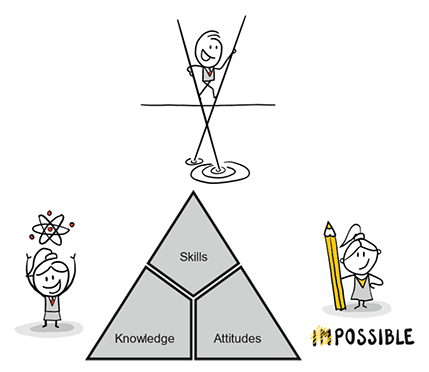What Needs to go into Learning to Make it Effective!

For corporate training to be successful, learning must be effective and lead to improvement in performance. There can’t be organizational growth without effective training. That is why the elements of learning play a pivotal role in the learning of your employees, and your experience as a training manager.
What is Learning?
“Learning is the process of acquiring new knowledge, gaining new skills, or changing attitudes, leading to a change in behavior.”
In the area of corporate training, learning can be of three types –Knowledge, Skills, and Attitudes.

- Knowledge is the information required to perform a task.
- Skills is the application of knowledge.
- Attitude is the way we look at things, our perception.
Check this webinar on 4 Rs of Rapid eLearning and Effective Corporate Training.
What is Effective Learning?
As we already saw, effective learning results in a change in behavior that leads to improved performance. To make the most of the learning experience, corporate learning solutions need to use certain key elements and principles of effective learning.
For Corporate Training that Yields Results…
Incorporate the 5 Important of Effective Learning
- DRIVE
- STIMULUS
- RESPONSE
- REINFORCEMENT
- REWARDS
Let’s now look at them in some detail.
What are the elements of effective learning?
- DRIVE is strong motivation for the learner – WANT TO LEARN.
- STIMULUS is the actual learning content that makes the learner learn.
- RESPONSE is how the learner responds to the stimulus.
- REINFORCEMENT of learning occurs with questionnaires/quizzes during the training/course .
- REWARDS encourage and motivate learners to enroll for a new training/course.
Learning will only be relevant and permanent when all these factors are included in the learning experience, be it instructor-led training or eLearning
Another important factor in corporate training is the implementation of adult learning principles in the course. Learning can be ineffective when adults are made to learn like how children learn.
How is Adult Learning Different?
Children’s brains are like blank slates and they are receptive to learn anything. They learn simply for the joy of learning. But adults have a different mindset when it comes to learning and that is captured in the adult learning principles.
- Adults want to always know WHY they should learn something.
- Adults have a deep need to be self-directing. They like to explore things and want to be in control of their learning.
- Unlike children, adults come with a lot of prior knowledge and experience.
- Adults do not learn for the joy of learning; they only learn if it helps them perform their jobs better.
- Adults are motivated by both extrinsic (wage hikes or increments) and intrinsic (increased self esteem, sense of achievement) motivators.
Adults are mostly driven by utility rather than curiosity. And the adult learning principles, if applied appropriately, will help them learn effectively.
The Learning Cycle
The Learning Cycle includes four components that ensure effective learning. The cycle starts with Review, followed by Learning, Application, and Adaptation. If any of these are omitted, learning will not be effective.
REVIEW answers the question “Why?”. It sets the context for the learning and informs the learner of the objectives. It also helps the learner connect existing to the new knowledge.
LEARNING answers the question “What?”. It comprises the actual content of learning, what the learner needs to learn.
APPLICATION answers the question “How?”. It provides opportunities for the learner to apply the new knowledge and skills.
ADAPTATION answers the question “Now what?”. This helps the learner adapt the newly acquired knowledge and skills to his job tasks.
To Sum it Up!
The benefits of effective learning are not just reaped by the learners. In the long run, organizations flourish if employees are efficient on the job. For more insights on successful eLearning implementation, get your hands on this practical guide, now!



![Incorporating 5 Gaming Elements in Mobile Learning [Infographic]](https://blog.commlabindia.com/hubfs/raw_assets/public/@marketplace/Drive_Web_Studio/Generator/images/img-blog-card-default.png)
![10 Must-Have Elements in a Structured Online Learning Journey [Infographic]](https://blog.commlabindia.com/hubfs/Imported_Blog_Media/online-learning-elements-effective-journey-infographic.jpg)
![3 Elements of a Well-Defined Learning Strategy [infographic]](https://blog.commlabindia.com/hubfs/Imported_Blog_Media/learning-strategy-elearning-courses-infographic-cover.jpg)